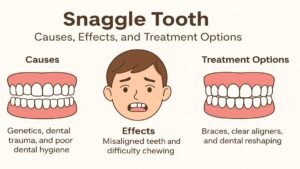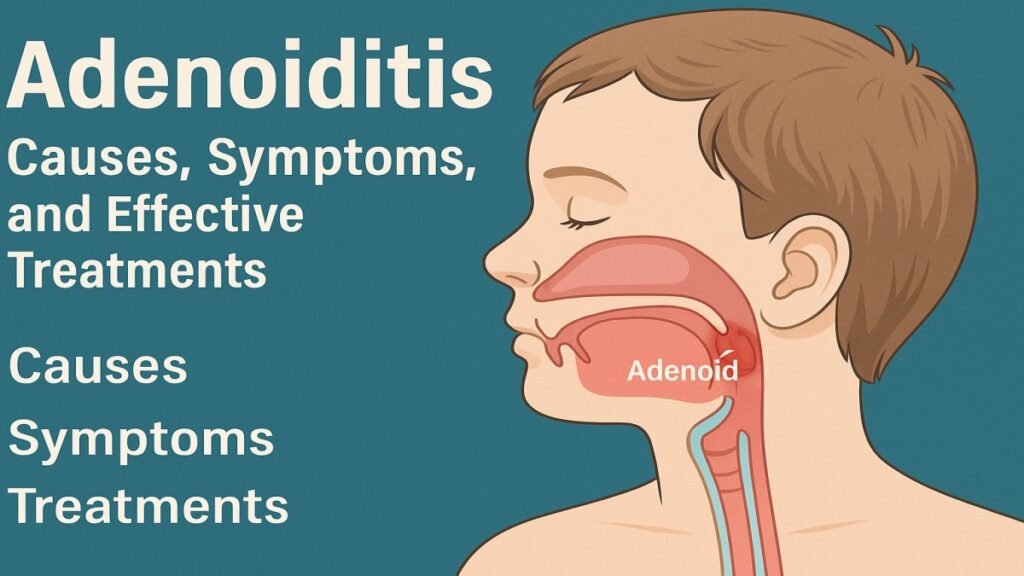Introduction to Adenoiditis
Ever wondered why some kids always seem to have a stuffy nose or struggle to breathe at night? One hidden culprit might be something called adenoiditis. While it sounds complicated, it’s actually quite common especially in children.
Let’s dive into what adenoids are and how they can cause issues when inflamed.
Understanding Adenoiditis
What is Adenoiditis?
Adenoiditis is the inflammation or infection of the adenoids, which are small lymphatic tissues located at the back of the nasal cavity. Think of them as bodyguards for your respiratory system—they trap bacteria and viruses before they reach your lungs.
Acute vs. Chronic Adenoiditis
- Acute adenoiditis happens suddenly and may last a few days to weeks.
- Chronic adenoiditis sticks around longer and often causes ongoing discomfort or recurring infections.
Causes of Adenoiditis
Bacterial Infections
One of the most common causes is bacteria—especially Streptococcus or Haemophilus influenzae. These bugs love to hang around the nose and throat, and if your immune system drops its guard, they seize the chance to infect the adenoids.
Viral Infections
Flu, common cold viruses, or adenoviruses (ironically) can also lead to inflammation.
Allergies and Irritants
Dust, smoke, or allergens like pet dander can irritate the adenoids, especially if someone already has hay fever or asthma.
Who is at Risk?
Children: The Usual Suspects
Kids between 3 and 7 years old are the most prone to adenoiditis. Why? Their adenoids are still developing and doing most of the heavy lifting when it comes to fighting germs.
Adults: Rare but Possible
While rare, adults can experience adenoiditis—usually linked to chronic sinus problems or weakened immunity.
Common Symptoms
- Stuffy or blocked nose
- Ear pain or hearing problems
- Snoring or noisy breathing
- Bad breath (halitosis)
- Recurring sore throats
- Sleep apnea
Kids may also show signs like talking with a nasal voice or difficulty eating due to mouth breathing.
How It’s Diagnosed
Physical Examination
Doctors may start with a simple check of the throat, nose, and ears.
Endoscopy
A tiny camera is inserted through the nose to view the adenoids directly.
Imaging Tests
In some cases, X-rays or CT scans might be used to see how enlarged the adenoids are.
Complications of Untreated Adenoiditis
If left unchecked, adenoiditis can cause:
- Chronic ear infections
- Hearing loss
- Speech delays
- Sleep disturbances
Think of it like ignoring a leaky roof—it only gets worse over time.
Treatment Options
Antibiotics
Bacterial infections usually respond well to a course of antibiotics.
Nasal Sprays and Decongestants
Steroid-based nasal sprays help shrink the swollen tissue.
Home Remedies
Warm fluids, saline rinses, and plenty of rest can do wonders in mild cases.
Surgical Treatment – Adenoidectomy
When nothing else works, or if infections keep returning, surgical removal of the adenoids (adenoidectomy) may be the best option.
What to Expect
- Outpatient procedure
- Takes less than an hour
- Children bounce back in about a week
When It’s Recommended
- Chronic infections
- Breathing or sleep issues
- Poor response to medications
Recovery Process
Lots of fluids, soft foods, and rest are key. Most kids are back to normal activities within a few days.
Managing Adenoiditis at Home
Steam Inhalation
It helps clear nasal passages and reduce inflammation.
Hydration and Rest
Staying well-hydrated and getting extra sleep boosts healing.
Avoiding Allergens
Keep your home smoke-free and dust-free to prevent flare-ups.
Prevention Tips
- Hand washing regularly
- Keeping sick contacts to a minimum
- Using a humidifier in dry environments
- Ensuring kids eat a balanced, immune-boosting diet
Adenoiditis vs. Tonsillitis
They’re neighbors in your throat, but not the same!
- Adenoiditis affects the nasal cavity and breathing
- Tonsillitis affects the throat and swallowing
They can, however, occur together—a double trouble situation!
Conclusion
Adenoiditis might be out of sight, but it shouldn’t be out of mind. From breathing troubles to sleep disruptions, it can affect everyday life—especially for children. Thankfully, with proper care, effective treatment, and (if necessary) minor surgery, it’s something that can be tackled head-on.
FAQs
1. Can adults get adenoiditis?
Yes, though rare, adults can develop adenoiditis, especially if they have chronic nasal issues.
2. Is adenoid removal risky?
Nope. It’s a safe, routine surgery with a short recovery time, especially in kids.
3. Will removing adenoids affect immunity?
Not significantly. Other immune tissues take over once adenoids are removed.
4. Can allergies cause adenoiditis?
Yes! Allergens like pollen and dust can irritate adenoids and mimic infection symptoms.
5. How can I help my child recover faster after surgery?
Plenty of fluids, soft foods, and lots of cuddles—they heal faster with comfort and care!








